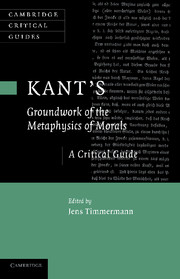Book contents
- Frontmatter
- Contents
- List of contributors
- List of translations and abbreviations
- Introduction
- 1 Ethics and anthropology in the development of Kant's moral philosophy
- 2 Happiness in the Groundwork
- 3 Acting from duty: inclination, reason and moral worth
- 4 Making the law visible: the role of examples in Kant's ethics
- 5 The moral law as causal law
- 6 Dignity and the formula of humanity
- 7 Kant's kingdom of ends: metaphysical, not political
- 8 Kant against the ‘spurious principles of morality’
- 9 Autonomy and impartiality: Groundwork III
- 10 Problems with freedom: Kant's argument in Groundwork III and its subsequent emendations
- 11 Freedom and reason in Groundwork III
- Bibliography
- Index
9 - Autonomy and impartiality: Groundwork III
Published online by Cambridge University Press: 04 August 2010
- Frontmatter
- Contents
- List of contributors
- List of translations and abbreviations
- Introduction
- 1 Ethics and anthropology in the development of Kant's moral philosophy
- 2 Happiness in the Groundwork
- 3 Acting from duty: inclination, reason and moral worth
- 4 Making the law visible: the role of examples in Kant's ethics
- 5 The moral law as causal law
- 6 Dignity and the formula of humanity
- 7 Kant's kingdom of ends: metaphysical, not political
- 8 Kant against the ‘spurious principles of morality’
- 9 Autonomy and impartiality: Groundwork III
- 10 Problems with freedom: Kant's argument in Groundwork III and its subsequent emendations
- 11 Freedom and reason in Groundwork III
- Bibliography
- Index
Summary
KANT'S GRAND PROJECT
Kant's project in the third section of the Groundwork is exhilaratingly bold. He seeks to obtain, from the idea of acting freely – which (we shall see) is the same as the idea of acting from reasons – a principle governing how rational beings should act. It consists in a requirement of impartiality of a particular kind. We human beings, Kant thinks, in virtue of our sensuous nature, experience this principle as a ‘categorical imperative’, a constraint to be obeyed whatever our inclinations and actual aims may be. However, the principle as such applies to all reason-responsive beings – as it must, given that it is derived from the mere idea of acting for a reason.
Kant gives a number of formulations of the principle, holding them to be equivalent. From these, he has already argued in the two previous sections, we can obtain the imperatives of morality. In fact, he believes his principle gives us all and only the universal principles of morality which govern the behaviour of all reason-responsive beings; it is, he claims, morality's ‘supreme principle’ (G IV 392), hence, the categorical imperative.
Thus, the argument has two steps: from acting for a reason to the categorical imperative, and from that to morality. Taken together in their full strength, the two steps would produce a truly extraordinary result: any being capable of acting for reasons is bound by principles whose content can be deduced from that very idea.
- Type
- Chapter
- Information
- Kant's 'Groundwork of the Metaphysics of Morals'A Critical Guide, pp. 159 - 175Publisher: Cambridge University PressPrint publication year: 2009
- 1
- Cited by

